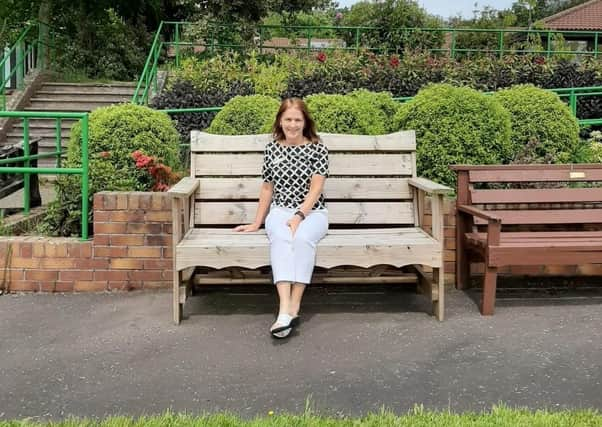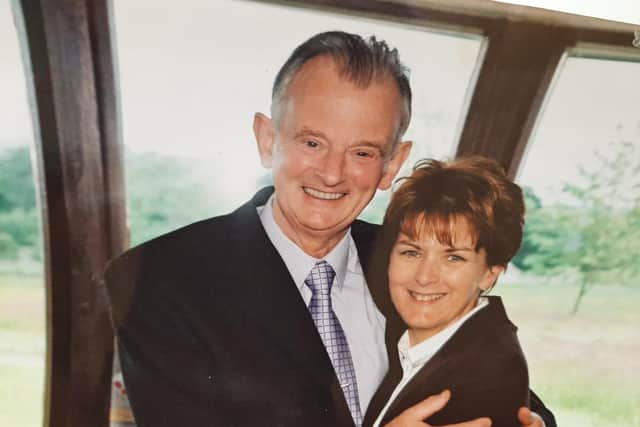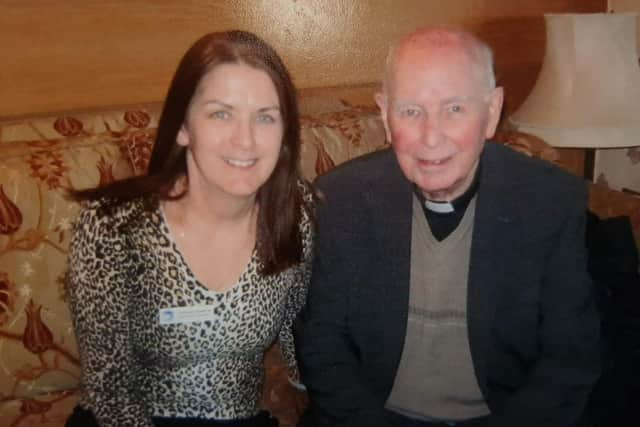‘I was always meant to be in palliative care’


The crucial, dedicated work of nurses has never been more to the fore than in recent months.
It is, perhaps, fitting that 2020 is the International Year of the Nurse and Midwife, as well as the 200th anniversary of the birth of Florence Nightingale, one of the most revered nurses of them all.
Advertisement
Hide AdAdvertisement
Hide AdAnother nurse who is known to many is Yvonne Martin, the Director of Nursing at Foyle Hospice.


In a career spanning almost 41 years, Yvonne has been by the side of thousands of people as lives began and others ended.
As a midwife in her early career, Yvonne has supported women through labour and held babies as they drew their first breath. And, in her role as a specialist palliative care nurse, she has comforted families in their time of grief and sorrow and walked with men and women in their final days and as they breathed their last.
Yvonne, from Enniskillen, will retire from Foyle Hospice this month and told the Journal how she always believed she would stay in midwifery, however, that was until she became ‘passionate’ about palliative care.
Advertisement
Hide AdAdvertisement
Hide AdYvonne first started nursing in October 1979 where she began her training in the Royal Victoria Hospital (RVH), during the Troubles, which added to her initial fears coming from a rural farming background. Her three year nurse training programme would today be referred to as the ‘old traditional route’ whereby most of her learning was acquired as she worked on the wards in the hospital – ‘learning on the ground’ – whilst spending short weeks two or three times annually in the classroom, unlike today when all aspiring nurses complete a degree programme to become a registered nurse. In later years, Yvonne wanted to experience university life and in 1991, decided to undertake a degree for registered nurses in Ulster University, BSc (Hons) Professional Development in Nursing.


At the same time, her daughter, Catherine, was six months old and Yvonne was hoping to obtain some part time work in order to balance her work and studies with home life.
Her sister informed her that Foyle Hospice were seeking part time nurses and Yvonne applied.
It was her first venture into palliative care nursing and Yvonne’s plan was to return to full-time midwifery when she finished her degree. But, she found a calling in palliative care, telling the Journal how this was due, in no small part, to the dedication of Foyle Hospice founder Dr McGinley.
Advertisement
Hide AdAdvertisement
Hide Ad“Many of us in the hospice say that our love of palliative care stemmed and grew from Dr McGinley’s enthusiasm. He was with us at the beginning and educated and enthused us all into palliative care, as well as making us so passionate about it. He was inspirational.”
Yvonne had wanted to become a nurse from a young age and was the first in her family of ten to do so.
“I can’t pinpoint any reason why, but there was always something in me that made me want to do it. A lot of my close friends from school went into nursing as well. I had always had an interest in midwifery and knew that once I finished my general training, I would pursue midwifery training once I gained experience as a staff nurse. But, I suppose I believe in some way your life is maybe laid out for you and I was always meant to be in palliative care – maybe it was palliative care that chose me. I do know there are quite a few nursing colleagues who started out in midwifery and are now in palliative care. You’re going from bringing life into the world to helping people die and have a good death and both jobs carry huge, but very rewarding, responsibilities.”
Yvonne later went on to complete a postgraduate specialist practice certificate, as well as a Masters in Palliative care, combining her studies with working. “My husband Brian used to joke that I was going to be an eternal student!”
Advertisement
Hide AdAdvertisement
Hide AdShe said that one of the great benefits about working within the hospice is the time you get to spend with patients and families on a one on one basis.
“I find that patients and their families don’t expect a lot from you. Quite often they will get information about their diagnosis and treatments from their GP and consultant and they just want you to sit with them, listen to their fears and concerns, talk to them and just give them precious time in an unrushed environment.
“In my ignorance and lack of full knowledge as to what hospice care was all about, I was naturally nervous as I was coming into the unknown. Added to this was the perception that it was going to be all death and dying, but you very quickly realise that’s not what it’s all about.
“Patients coming to the hospice, which remember was also a totally new concept to the people of the North West, want to have the chat and craic as well as getting their symptoms managed, they want their TV and music going, and just have that time of normality savouring the simple things of life. The main thing we are doing here is helping people live better until they die – aiming to improve their overall quality of life.”
Advertisement
Hide AdAdvertisement
Hide AdYvonne formed part of the community team from 1997 through to 2004 covering the Derry and the Inishowen area, attending to the “loveliest” people in their homes, one on one. She described this as ‘very rewarding’ and said the patients themselves, and their families, always made the job easier on the nurses by being so welcoming, despite the difficult journey they were travelling at the time.
“There were times you would wonder if it would be ok - you’re going into people’s homes at a devastating time for them. But the patients themselves are so open and honest and they wanted you to be like that as well.
“What a lot of people would have fed back to me was that they appreciated the time you took with them. You quickly learned not to turn down a cup of tea or coffee (not to mention the buns and biscuits). Many times, people would use that time to open up and have a good chat.”
As well as giving support in the community to patients and helping to keep them pain and symptom free in their own homes, part of the follow up care was Bereavement Support.
Advertisement
Hide AdAdvertisement
Hide Ad“We would always try to visit a wake or attend the funeral of a patient and then might have visited the family maybe around three months or six months later. And we’d always make a point of calling around the anniversary. Families and the bereaved always appreciated the opportunity to talk about their loved one who had died and even now, I would have people come up to me and tell me I cared for someone they loved. It’s really nice to be remembered by them and I have hundreds of lovely cards which I will keep forever.”
Whilst discussing her bereavement support role Yvonne reflected on Bishop Daly, a fellow Fermanagh native, and the time and dedication he gave to the hospice. He was respected and loved by everyone, regardless of their religion – the patients, families and staff. Just as Dr Mc Ginley was inspirational in bringing hospice care to the North West, so was Bishop Daly in his Spiritual Director role, bringing much needed support and comfort to patients and families as they struggled with their illness. That support also extended to all staff in the hospice and he is still sorely missed today.
Yvonne told how many families would have spoken to the nurses as they didn’t want to upset anyone else in their family and this was a ‘great privilege.’
Palliative care, she explained, isn’t just administering medications or keeping a patient comfortable, it is “incorporating the physical, the psychological, the emotional and the spiritual – it looks after the whole person.”
Advertisement
Hide AdAdvertisement
Hide AdIn the early days, hospice care was synonymous with those diagnosed with cancer only, but it has now expanded to people with all life limiting conditions which is good for everyone concerned.
Yvonne, who also travels as a nurse with the Derry Diocese on annual trips to Lourdes, has described her career in nursing as ‘a great honour.’
She was due to retire in April, but chose to extend her time to June in the midst of the coronavirus pandemic. While she will miss her work in the hospice and all her great colleagues and friends she has made over the years, she feels the time for her retirement is right. She hopes to do some travelling and trekking with her family and told how, amongst the many things her time as a palliative nurse has taught her, one of the most important is that it is vital to appreciate the little things in life in the short time we have on this earth.
Career in Nursing & Midwifery
October 1979 – October 1982, General Nurse training in the RVH
Advertisement
Hide AdAdvertisement
Hide AdOctober 1982 – November 1983, Staff Nurse in Acute Orthopaedics, RVH
November 1983 – April 1985, Midwifery Training in Royal Maternity Hospital
June 1985 – July 1986, Staff Midwife in Royal Maternity Hospital
July 1986 – October 1991, Staff Midwife, Altnagelvin Hospital Maternity Unit
Advertisement
Hide AdAdvertisement
Hide AdOctober 1991 – June 1994, Studying for BSc (Hons) Degree Professional Development in Nursing
October 1991 – June 1997, Staff Nurse working 2 nights in Foyle Hospice whilst studying for degree
July 1997 – July 2004, CNS in Palliative Care in the Community,
October 1997 – June 1999, studied for Postgraduate Specialist Practice Certificate
October 2002 – June 2004, studied for MSc in Palliative Care
August 2004 – current, took up post as Director of Nursing in Foyle Hospice.